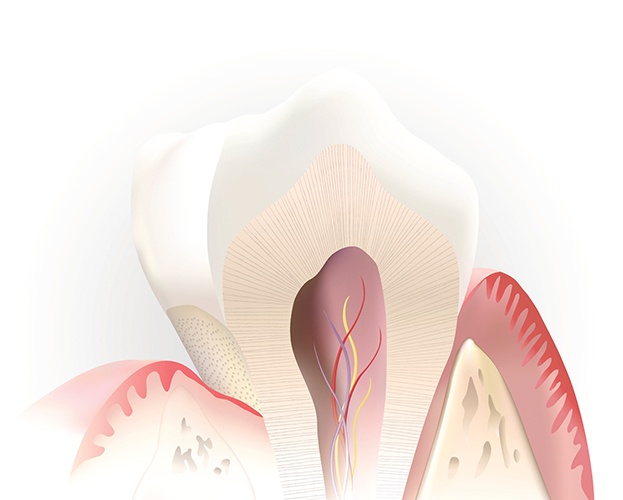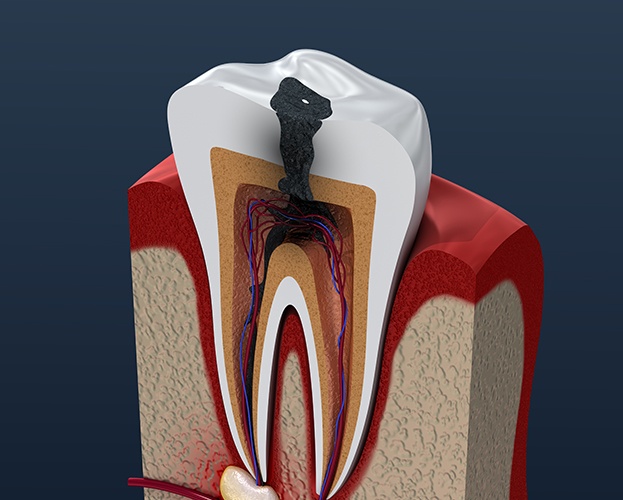Root Canal Treatment – Williamsville, NY
We Save Hurting Teeth from Extraction
When it comes to fears, undergoing a root canal is typically at the top of the list. In fact, did you know that more people seem to be afraid of root canals than of speaking in public? But at Amherst Dental Group, you don’t have to worry if we recommend this treatment. Our experts will make sure you’re comfortable all the way through so that you’re left smiling with your strong, natural teeth for as long as possible. If you want to learn more about root canal treatment, keep reading the information below. Are you experiencing tooth pain? Don’t hesitate to reach out to our team and schedule an appointment for root canal treatment in Williamsville, NY!
Why Choose Amherst Dental Group for Root Canal Treatment?
- Sedation Options for Anxious Patients
- State-of-the-Art Dental Technology
- High Quality, Durable Dental Crowns
What Is a Root Canal?

A lot of people fear getting a root canal simply because they don’t fully understand what it is. Root canal treatment is a procedure in which the dentist removes the central pulp (or nerves) and other soft tissue from a tooth. Although many patients experience severe pain prior to having a root canal, the procedure itself involves very little, if any, discomfort, and it ensures that the patient feels no pain afterward and is still able to continue using that tooth for eating, speaking, and smiling.
Why Is a Root Canal Necessary?

Without root canals, millions of teeth would need to be removed altogether and eventually replaced. While experiencing the pain that often comes before a root canal procedure, patients may think that they would be better off having the tooth extracted. But the truth is that tooth replacements, while coming close to replicating the real thing, still aren’t quite as effective as your natural teeth. It is worth the effort to save a natural tooth, which is only possible through root canal treatment.
Signs You Need a Root Canal

The common and obvious symptom preceding a root canal is pain or extreme sensitivity in the tooth, but this is not a prerequisite. Whether you’re in pain or not, you need a root canal when decay or damage to the tooth has reached the center. As a result, the exposed pulp becomes vulnerable to harmful bacteria. Other situations where a root canal becomes necessary include a broken or fractured tooth from trauma. When our dental experts say a root canal is needed, the alternative is extraction.
Understanding the Cost of Root Canals

Although all root canal procedures involve removing the pulp of the tooth, the cost of root canal treatment in Williamsville can vary on a case-by-case basis because of the extent of the damage. Once we have had a chance to examine your hurting tooth, we should be able to give you a better idea of what to expect in terms of the cost. However, we can say with certainty that the longer you put off necessary root canal treatment, the more severe—and expensive—the problem will become.
Factors That Can Affect Root Canal Cost
Often, the cost of treatment depends on the severity. Minor root canals can be repaired using composite resin fillings, which costs less, while others may require a dental crown to restore lost tooth structure. Also, some root canals may be complex, requiring a longer procedure or sedation to keep the patient comfortable and relaxed. We take all these factors into account when calculating the cost of the procedure and will be completely open with you about it.
Is it Cheaper to Pull My Tooth?
It may seem simpler to just have the tooth removed instead of going through all this trouble, but the truth is that extracting and then replacing a tooth cost significantly more than root canal treatment. While root canal treatment prolongs your tooth’s lifespan and is usually completed in two appointments, replacing a tooth entirely requires many more dental appointments and a much higher cost for restorations. If you have the ability to save the tooth from extraction, it is almost always more cost effective to do so.
Does Dental Insurance Cover Root Canal Treatment?
Exact coverage can differ based on your plan, but most dental insurance policies pay for part of the cost of root canal treatment. In general, this treatment is about 50 percent covered, meaning you’ll be responsible for the other 50 percent out-of-pocket. When we put together your treatment plan, we can discuss the details of your insurance policy with you. That way, you have a clear idea of what you’re expected to pay.
Other Options for Making Root Canal Treatment Affordable
Worries about the money shouldn’t keep you from getting treatment you need. For many patients, even with insurance, paying for root canal treatment and the restoration all upfront can put a strain on their finances. If you would like to divide the total into smaller monthly payments, we can help you apply for low-interest financing through CareCredit, which is trusted throughout the country. We also allow you to make payments to our practice online for your convenience.
Root Canal FAQs

With so many myths surrounding root canal treatment, you may have questions about this procedure. We want you to have all the information you need to dispel your fear and get the treatment you need to preserve your smile. Although you are free to ask us whatever questions you have during your appointment, we have answered some common questions about root canals below for your convenience.
How Long Does Root Canal Treatment Take?
Fortunately, a root canal can typically be completed in just one appointment. After the anesthetic has kicked in, the procedure itself should last between 30 and 90 minutes, depending on which tooth needs to be treated. Molars have more roots and, therefore, require more time to clean out. Plus, they can be more challenging to access in the mouth. We will do our best to work efficiently and keep you comfortable throughout your time with us.
Can I Take Antibiotics Instead of Getting a Root Canal?
Although antibiotics can successfully fight bacterial infections throughout the body, they do not work on teeth, because the bloodstream does not directly pass through the center. As a result, this treatment does not do much to stop or heal tooth decay. A root canal is your best alternative if you want to avoid extraction and the risk that the infection could spread to other teeth or other parts of the body.
What Happens During a Root Canal?
Before we do anything else, we will give you a local anesthetic, which numbs the treatment area. As a result, you won’t be able to feel any pain. In addition, we can provide you with dental sedation, which can calm your nerves and help you feel more comfortable. Then, we will remove the decayed parts of your tooth structure and take out the central nerve. Once the inside of the tooth has been cleaned and sealed, we will place a restoration—either a filling or crown—over the tooth, protecting it from becoming decayed again in the future.
What Is the Recommended Aftercare for a Root Canal?
For a few hours after a root canal, we strongly recommend that you don’t eat solid foods because your mouth may still be numb, and you don’t need to risk accidentally biting your tongue or cheek. By the next day, you should be able to resume normal activities, but be aware that some mild soreness is common for a few days. Until you get your permanent crown, you probably want to avoid sticky foods. As always, your oral hygiene is essential to prevent reinfection, so you’ll need to brush and floss your teeth every day. Also, regular checkups and cleanings will ensure that cavities won’t come back and harm the remaining tooth.
I Need a Checkup & Cleaning I Need a Dentist for My Child I am Concerned about Bleeding Gums I Have a Cavity or Broken Tooth I am Missing One or More Teeth I am Unhappy with My Smile I Want a Straighter Smile I am Scared of the Dentist I am in Pain & Need Help I Need My Wisdom Teeth Removed View Our Services

